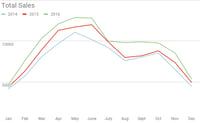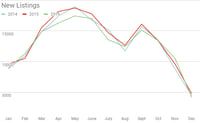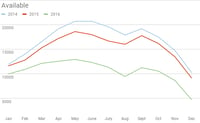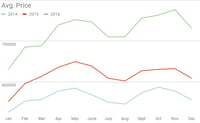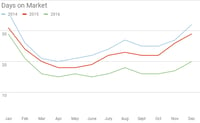Dave Larock in Monday Interest Rate Update, Mortgages and Finance, Home Buying, Toronto Real Estate News
Editor's Note: Dave's Monday Morning Interest Rate Update appears on
Move Smartly weekly. Check back weekly for analysis that is always
ahead of the pack.
Cyprus is a tiny country that accounts for only 0.2% of the euro zone’s economic
output and its finances are broken beyond repair.
Given its small size, the temptation to use Cyprus to set a tough new
precedent for future euro-zone bailout proposals is understandable. This is
especially true for German Chancellor Angela Merkel, who will stand for
re-election in September and who needs to re-establish her austerity-at-all-cost
credentials with German voters after repeatedly compromising on bailout
deadlines for the euro zone’s larger countries.
From that perspective, last weekend’s bailout proposal was just what the
Chancellor Merkel’s political strategists ordered. It came with the toughest
bailout provisions yet, including an unprecedented requirement that Cypriot
deposit accounts with balances of less than 100,000 euros be charged a one-off
tax of 6.50%.
This proverbial pound of flesh was supposed to reassure German voters that no
one in the euro zone’s profligate peripheral countries would be immune from
consequences of over-indebtedness. But the same principal that was designed to
sell well on the German campaign trail also threatens to undermine all of the
euro-zone leader’s confidence-restoring efforts since the financial crisis
began. Ironically, the decision to introduce the threat that small-scale bank
depositors could lose part of their savings in future euro-zone bailouts has
almost certainly raised the cost of future bailouts for the same German voters
that this policy was intended to appease.
Share on Facebook • Email this • Twit This!
Posted at 11:48 AM in David Larock, Home Buying, Interest Rate Update, Money, Toronto Real Estate News | Permalink
March 18, 2013
Monday Morning Interest Rate Update (March 18, 2013) - The Euro-zone Crisis Moves Back to the Front Burner
Dave Larock in Mortgages and Finance, Home Buying, Toronto Real Estate News, Interest Rate Update
Long time readers of my Updates
will remember that last year I was writing about how our ultra-low mortgage
rates were partly a by-product of rising investor fears of a euro-zone
collapse.
The Bank of Canada (BoC) was loath to raise its overnight
rate in the face of so much global uncertainty and our Government of Canada
(GoC) bonds were in high demand as capital fled into a shrinking
pool of safe-haven sovereign debt. Canadian fixed- and variable-rate borrowers
alike were taken along for the ultra-low rate ride. But then European Central
Bank (ECB) President Mario Draghi stared down Spanish and Italian
bond-market vigilantes with his promise to “do whatever it takes” to save the
euro zone and the crisis retreated from the headlines and appeared to calm from
a boil to a simmer.
While I haven’t written about the euro-zone crisis for a while, it is still
far from over. In fact, thanks to the latest bailout plan for Cyprus, it is back
on the front pages today. 
The problem that has been building in the euro zone for some time is that the
German-led austerity initiatives that were supposed to put imperiled euro-zone
countries back on the path to fiscal solvency haven’t worked. So far at least,
government spending cuts and sharply higher taxes have stifled economic growth
and have caused revenues to fall faster than expenditures.
As these already gaping government deficits widen and reduction targets are
missed, the response from the German-led Troika, comprising the European
Commission (EC), the International Monetary Fund (IMF) and the ECB), has been to
impose still more austerity. Meanwhile, the response from voters in the euro
zone’s imperiled peripheral countries has been to throw increasing support
behind nationalistic leaders who run on anti-austerity platforms. I think it
will be this growing friction that fuels the next wave of the euro-zone
crisis.
Posted at 01:35 PM in David Larock, Home Buying, Interest Rate Update, Money, Toronto Real Estate News | Permalink
March 11, 2013
Monday Morning Interest Rate Update (March 11, 2013) - Bank of Canada More Cautious on Mortgage Rate Rise

Bond-market yields yo-yoed last week, with more subdued comments from the Bank
of Canada (BoC) pushing them down last Wednesday before strong employment
reports from both the U.S. and Canada pushed them higher on Friday.
When the BoC met last week, it kept its overnight rate unchanged at 1.00% as
expected. In its accompanying commentary the Bank softened its interest-rate
guidance once again, saying that “the considerable monetary stimulus currently
in place will likely remain appropriate for some period of time, after which
some modest withdrawal will likely be required”.
Here are my key takeaways from the Bank’s latest statement:
- The BoC offered a more optimistic view of global economic growth, thanks
largely to improving conditions in China, and it attributed the fourth-quarter
slowdown in our domestic economic momentum to a decline in inventories. This is
noteworthy because a slowdown that is caused by a reduction in inventories can
be transitory if businesses subsequently increase their production and replenish
their stockpiles quickly. - The BoC statement referred to “a more constructive evolution of imbalances
in the housing sector”. This means that the Bank is now less concerned about the
risk of housing and credit bubbles. That is significant because BoC Governor
Mark Carney has repeatedly referred to rising household debt levels as the
greatest threat to our domestic economy.
Posted at 02:36 PM in David Larock, Home Buying, Interest Rate Update, Money, Toronto Real Estate News | Permalink
March 04, 2013
Monday Morning Interest Rate Update (March 4, 2013): What Slower GDP Growth Means for Mortgage Rates
Dave Larock in Mortgages and Finance, Home Buying, Toronto Real Estate News, Interest Rate Update
Statistics Canada released its latest round of GDP data last Friday and it
provided further confirmation that our economy is hovering at just above stall
speed.
The report showed that our GDP actually declined by 0.2% in December,
bringing our fourth quarter GDP growth to a paltry 0.6% on an annualized basis.
While our economy registered total GDP growth of 1.8% over the full year, our
momentum slowed markedly in the second half.
As we piece together each new data point in our evolving economic picture,
signs of deceleration are everywhere. Our latest GDP, employment and inflation
reports merely confirm, at a macro level, the slowdown that we see in housing
starts, factory shipments, exports, retail sales and so on.
None of this should really come as a surprise. Every major economy in the
world has faced its own growth challenges since the start of the Great
Recession. While we weathered the initial storm better than most, our small,
open economy could not reasonably be expected to operate above trend
indefinitely.
We initially used ultra-low interest rates to boost consumer spending and
this provided an effective buffer against falling export demand. But this
solution also led to sharply increasing household debt levels and real estate
prices, and was never intended to be a permanent fix.
As the Great Recession dragged on, the Bank of Canada (BoC) and the federal
government grew increasingly concerned about the risk of credit and housing
bubbles (rightly so in my opinion). In response, Federal Finance Minister Jim
Flaherty repeatedly took steps to slow household borrowing. The recent data show
that these steps are finally working – household debt levels are rising at their
slowest rate in more than a decade. But this development begs an important new
question: If consumer spending isn’t going to drive our economic growth in 2013,
what will?
Posted at 12:37 PM in David Larock, Home Buying, Interest Rate Update, Money, Toronto Real Estate News | Permalink
February 25, 2013
Monday
Morning Interest Rate Update (February 25, 2013) – How Will the U.S.
Fix its Debt Problem and What Will it Mean for Canadian Mortgage Rates?
Dave Larock in Mortgages and Finance, Home Buying, Toronto Real Estate News, Interest Rate Update
Canada’s Consumer Price Index (CPI) has shown another drop in overall
inflation, to 0.5% in January. Over the same period, the U.S. CPI came in flat,
at 1.6%, for the most recent twelve months.
The latest U.S. and Canadian CPI data bolster my belief that the Bank of
Canada (BoC) is more likely to lower, rather than raise, its overnight rate as
its next move to maintain its medium-term inflation target of 2%.
That said, while I continue to believe that inflation will remain benign for
the foreseeable future, eventually, inevitably, it will rise in accordance with
the intentions of the U.S. Fed (more on that in a minute).
First, let’s look at how large deficits and high levels of government debt
have impacted our mortgage rates to date.
Much of the developed world is now mired in a mutually reinforcing cycle
where high government debt and deficits act as a drag on growth, which lowers
business and consumer confidence and with it, consumer demand. Low demand causes
disinflation and in such an environment, central banks lower their policy rates
to ward off the threat of deflation. They do this primarily to stimulate
spending and investment but also to lower the interest cost of financing their
governments’ deficits. If policy rates reach 0%, central banks like the U.S.
Federal Reserve then resort to unconventional methods, like quantitative easing,
to inject further liquidity into their economies. This allows all debt levels to
increase still further. It’s like a drug dose to an addict - it helps in the
short term but just makes the long term more difficult.
At a very basic level, bloated government debt and deficit levels have fueled
today’s low-interest-rate environment. Here’s how this feedback loop works:
Posted at 02:14 PM in David Larock, Home Buying, Interest Rate Update, Money, Toronto Real Estate News | Permalink
February 19, 2013
Tuesday Morning Interest Rate Update (February 19, 2013) – The Distant Risk of Higher Mortgage Rates
Dave Larock in Mortgages and Finance, Home Buying, Toronto Real Estate News
Today’s economic data imply that our mortgage rates will stay low for the
foreseeable future. So much so that even the ‘end-of-low-rates-is-nigh’
forecasters at the Bank of Canada (BoC) have finally come around to the
lower-for-longer rate view.
Cue my contrarian itch, which reminds me of Bob Ferrell’s rule number nine
from his famous Ten
Market Rules to Remember: “When all the experts and forecasters agree –
something else is going to happen.”
Mr. Ferrell’s rule reminds me that markets have a long history of surprising
us and while the odds of rates staying low for some time yet are stacked in our
favour, make no mistake, the seeds that will eventually push rates higher
(perhaps dramatically so) are being sown in abundance. Bluntly
Bluntly
put, there is no historical precedent for what central banks are doing today.
Not even close. We are knee-deep into a period where these banks have become the
financial markets’ marginal buyers of sovereign debt, artificially suppressing
government bond yields and grotesquely distorting free-market forces.
This money-printing-by-another-name is politically expedient because it
allows over-indebted governments to continue running huge deficits and expanding
crippling debt levels that have, in many cases, been some seventy years in the
making. Consider the following:
Posted at 09:27 AM in David Larock, Home Buying, Interest Rate Update, Money, Toronto Real Estate News | Permalink
Profile

the Move Smartly blog is brought to you by the team at Realosophy Realty
Facebook Fans
Realosophy's Most Viewed Neighbourhoods
Search This Blog
Topics
Long time readers of my Updates
will remember that last year I was writing about how our ultra-low mortgage
rates were partly a by-product of rising investor fears of a euro-zone
collapse.
The Bank of Canada (BoC) was loath to raise its overnight
rate in the face of so much global uncertainty and our Government of Canada
(GoC) bonds were in high demand as capital fled into a shrinking
pool of safe-haven sovereign debt. Canadian fixed- and variable-rate borrowers
alike were taken along for the ultra-low rate ride. But then European Central
Bank (ECB) President Mario Draghi stared down Spanish and Italian
bond-market vigilantes with his promise to “do whatever it takes” to save the
euro zone and the crisis retreated from the headlines and appeared to calm from
a boil to a simmer.
While I haven’t written about the euro-zone crisis for a while, it is still
far from over. In fact, thanks to the latest bailout plan for Cyprus, it is back
on the front pages today. 
The problem that has been building in the euro zone for some time is that the
German-led austerity initiatives that were supposed to put imperiled euro-zone
countries back on the path to fiscal solvency haven’t worked. So far at least,
government spending cuts and sharply higher taxes have stifled economic growth
and have caused revenues to fall faster than expenditures.
As these already gaping government deficits widen and reduction targets are
missed, the response from the German-led Troika, comprising the European
Commission (EC), the International Monetary Fund (IMF) and the ECB), has been to
impose still more austerity. Meanwhile, the response from voters in the euro
zone’s imperiled peripheral countries has been to throw increasing support
behind nationalistic leaders who run on anti-austerity platforms. I think it
will be this growing friction that fuels the next wave of the euro-zone
crisis.
The real lynchpin in each euro-zone bailout is German
Chancellor Angela Merkel, who has used the austerity programs
imposed by the Troika as her political cover for risking Germany’s strong
national balance sheet to keep the euro zone from imploding. But there has been
a growing disconnect between Chancellor Merkel’s tough talk on austerity and the
actual policies being implemented on the already austerity-scorched economic
earth in the bailed out euro-zone countries. This is a disconnect that her
political opponents will highlight in the lead-up to German federal election on
September 22, 2013, and I think it partly explains why the just announced Cyprus
bailout proposal is attempting to forge new and dangerous ground (more on that
in a minute).
The euro-zone leadership would like nothing better than a quiet summer
leading up to the German election. Nothing would upset the fragile euro-zone
experiment more dramatically than diminished German support for this
pan-European experiment. The challenge is that while the experts I read still
believe Germany will be asked to do much more (such as debt metallization, or
even outright debt forgiveness) before the current crisis ultimately abates,
sharing this candid assessment with German voters isn’t a recipe for electoral
success.
The timing of euro-zone developments over the next six months is critical. If
a new crisis forces austerity-weary voters in the imperiled euro-zone countries
to come face-to-face with bailout-weary German voters, this could push the whole
experiment to its breaking point. (In fact, I believe the message contained in
the Cyprus bailout proposal is sowing the seeds of the next crisis as I write
this.)
To that end, here are several recent euro-zone developments that bear
watching:
- Cyprus received a bailout offer over the weekend and for the first time,
savers who had deposits in Cypriot banks with supposedly insured balances will
lose 6.75% of their money as part of the bailout. Until then, deposits have been
staunchly protected throughout the euro-zone crisis. Now that depositors have
been tapped in the euro-zone’s latest crisis, depositors all over the euro zone
will be nervous, in some countries very nervous. There is now much more risk of
bank runs and of large, destabilising transfers of money out of the weaker banks
and countries. - Italy has the third largest bond market in the world and last week
Fitch, a major rating agency, downgraded Italy’s sovereign bond rating to BBB+
and kept its outlook as ‘negative’ (meaning Fitch sees future negative momentum
for Italian bonds). Italian ten-year bond yields closed last week at a
manageable 4.60%. But just suppose Italy’s politicians fail to form a government
and another election is called, this time with more anti-austerity and
anti-euro-zone rhetoric? Given that bond yields surged .30% during the last
vote, how much will they surge this time? If the ECB needs to start buying
Italian bonds en masse, what austerity can the Troika impose with
both Italian and German elections in the offing? - On a more general level, euro-zone GDP is expected to contract by 0.3% in
2013, unemployment rates are soaring (Greece – 27%, Spain – 26%, Portugal – 18%,
France – 11%), and the emergency Long-term Refinancing Operation (LTRO) loans
that were made by the ECB have not been repaid at anything like the expected
rate. Really, the current state of the euro zone means that the next crisis
could come from just about anywhere.
Government of Canada (GoC) five-year bond yields fell by
one basis point over the past week, closing at 1.37% on Friday. Five-year
fixed-rates are widely available in the sub-3% range as lenders continue to vie
for spring-market business. With such aggressive rate competition, borrowers
have the luxury of focusing on each lender’s terms
and conditions - and these can make a surprisingly big difference to your
borrowing costs over time (the link in the last sentence gives you one glaring
example).
Five-year variable-rate mortgages are still being offered in the prime
minus 0.40% range (which works out to 2.60% using today’s prime rate). The
BoC has just changed its Mortgage
Qualifying Rate (MQR), which is used to qualify all variable-rate
applications. The MQR was lowered from 5.24% to 5.14%, thus making it a little
easier for borrowers who are interested in variable-rate financing to
qualify.
The Bottom Line: If the threat of sovereign default in the euro
zone rises again, I think investors will once again seek safety in
GoC bonds. This would put downward pressure on our GoC
bond yields and by association, our fixed-mortgage rates. But if the euro zone
breaks up and sovereign defaults actually occur, bond market investors may then
demand a higher return for all sovereign debt, which would push our bond yields
(and fixed-mortgage rates) higher. That’s why I will remain an ‘interested’
observer as the euro-zone crisis returns to a boil in the coming months.
David Larock is an independent mortgage planner and industry insider specializing in helping clients purchase, refinance or renew their mortgages. David's posts appear weekly on this blog (movesmartly.com) and on his own blog integratedmortgageplanners.com/blog). Email Dave




